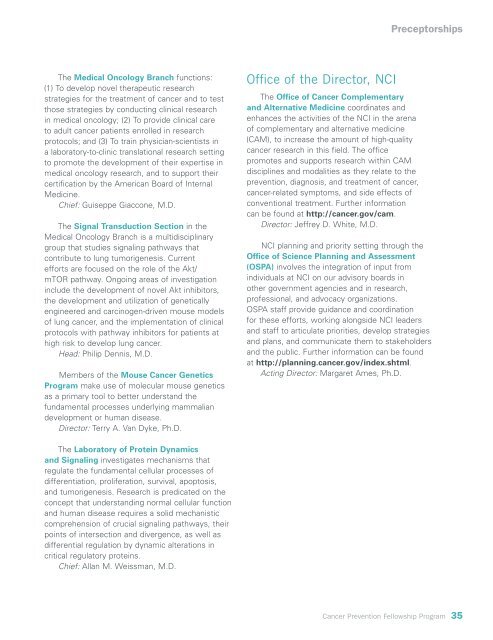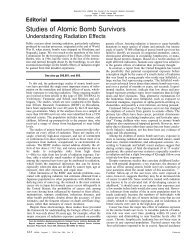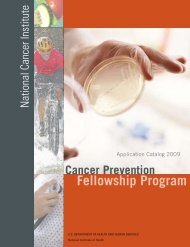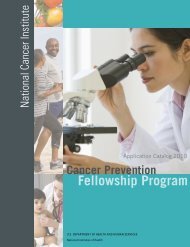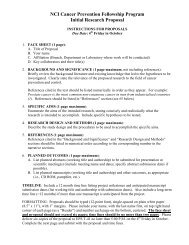Fellowship Program - National Cancer Institute
Fellowship Program - National Cancer Institute
Fellowship Program - National Cancer Institute
You also want an ePaper? Increase the reach of your titles
YUMPU automatically turns print PDFs into web optimized ePapers that Google loves.
Preceptorships<br />
The Medical Oncology Branch functions: <br />
(1) To develop novel therapeutic research<br />
strategies for the treatment of cancer and to test<br />
those strategies by conducting clinical research<br />
in medical oncology; (2) To provide clinical care<br />
to adult cancer patients enrolled in research<br />
protocols; and (3) To train physician-scientists in<br />
a laboratory-to-clinic translational research setting<br />
to promote the development of their expertise in<br />
medical oncology research, and to support their<br />
certification by the American Board of Internal<br />
Medicine.<br />
Chief: Guiseppe Giaccone, M.D.<br />
The Signal Transduction Section in the<br />
Medical Oncology Branch is a multidisciplinary<br />
group that studies signaling pathways that<br />
contribute to lung tumorigenesis. Current<br />
efforts are focused on the role of the Akt/<br />
mTOR pathway. Ongoing areas of investigation<br />
include the development of novel Akt inhibitors,<br />
the development and utilization of genetically<br />
engineered and carcinogen-driven mouse models<br />
of lung cancer, and the implementation of clinical<br />
protocols with pathway inhibitors for patients at<br />
high risk to develop lung cancer.<br />
Head: Philip Dennis, M.D.<br />
Members of the Mouse <strong>Cancer</strong> Genetics<br />
<strong>Program</strong> make use of molecular mouse genetics<br />
as a primary tool to better understand the<br />
fundamental processes underlying mammalian<br />
development or human disease.<br />
Director: Terry A. Van Dyke, Ph.D.<br />
Office of the Director, NCI<br />
The Office of <strong>Cancer</strong> Complementary<br />
and Alternative Medicine coordinates and<br />
enhances the activities of the NCI in the arena<br />
of complementary and alternative medicine<br />
(CAM), to increase the amount of high-quality<br />
cancer research in this field. The office<br />
promotes and supports research within CAM<br />
disciplines and modalities as they relate to the<br />
prevention, diagnosis, and treatment of cancer,<br />
cancer-related symptoms, and side effects of<br />
conventional treatment. Further information<br />
can be found at http://cancer.gov/cam.<br />
Director: Jeffrey D. White, M.D.<br />
NCI planning and priority setting through the<br />
Office of Science Planning and Assessment<br />
(OSPA) involves the integration of input from<br />
individuals at NCI on our advisory boards in<br />
other government agencies and in research,<br />
professional, and advocacy organizations.<br />
OSPA staff provide guidance and coordination<br />
for these efforts, working alongside NCI leaders<br />
and staff to articulate priorities, develop strategies<br />
and plans, and communicate them to stakeholders<br />
and the public. Further information can be found<br />
at http://planning.cancer.gov/index.shtml.<br />
Acting Director: Margaret Ames, Ph.D.<br />
The Laboratory of Protein Dynamics<br />
and Signaling investigates mechanisms that<br />
regulate the fundamental cellular processes of<br />
differentiation, proliferation, survival, apoptosis,<br />
and tumorigenesis. Research is predicated on the<br />
concept that understanding normal cellular function<br />
and human disease requires a solid mechanistic<br />
comprehension of crucial signaling pathways, their<br />
points of intersection and divergence, as well as<br />
differential regulation by dynamic alterations in<br />
critical regulatory proteins.<br />
Chief: Allan M. Weissman, M.D.<br />
<strong>Cancer</strong> Prevention <strong>Fellowship</strong> <strong>Program</strong> 35


